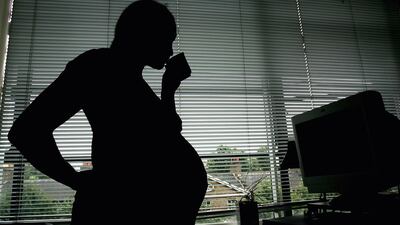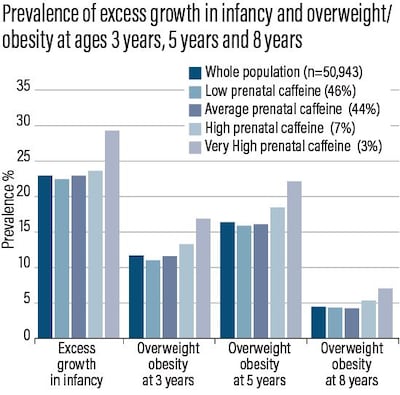Coffee-loving mums-to-be could be increasing the chances of their children being overweight according to new research on more than 50,000 pregnant women.
The Norwegian study, published in the peer reviewed British Medical Journal, compared the varying caffeine intake of 50,943 mothers using a model to assess individual growth trajectories in children from birth up to the age of 8.
Results showed that children prenatally exposed to more than 200mg of caffeine a day had consistently higher weight, and a higher Body Mass Index recording during childhood.
Information on the mums’ dietary habits were gleaned via questionnaires completed during the first 22 weeks of pregnancy.
Of those taking part, 46 per cent had a low caffeine intake, 44 per cent had normal levels while 10 per cent had either high or very high levels of caffeine consumption during pregnancy.
Medics have previously warned of the "toxic" effect that caffeine can have on children.
Doctors in Dubai have said the results lend weight to the advice that expectant women should reduce their caffeine intake, or avoid it altogether with many unaware of the content in other foodstuffs.
“Pregnant women are advised to cut off caffeine completely,” said Dr Gul Rana, a specialist in obstetrics and gynaecology at the Canadian Specialist Hospital, Dubai.
“If that seems impossible, the consumption of caffeine should be reduced as much as possible and be limited to one cup a day.
“Decaffeinated coffee is a good alternative and easily available at coffee shops.
"Women must note that coffee and tea aren’t the only source of caffeine, as it's often present in chocolates, sodas and some pain relief medicines.”
Of those children born to women with a low caffeine intake, 11 per cent were overweight at age three, while 17 per cent of children born to mothers with very high caffeine levels, were overweight – as classified by WHO benchmarks.
Caffeine is the world’s most widely consumed central nervous system stimulant and occurs naturally or is added to foods and beverages.
After ingestion, caffeine is readily absorbed into the bloodstream and distributed to the tissues, and then metabolised in the liver.
During pregnancy, elimination of caffeine is prolonged, rapidly passing all biological membranes, including the blood-brain and placenta barriers, exposing the foetus.
“We have come across pregnant women suffering from common side effects like insomnia and increased heart rate and blood pressure,” said Dr Gul.
“Severe side effects have been observed among patients consuming high dose of caffeine through energy drinks.
“There is no safe level of caffeine consumption.
"Although, the research conducted suggests less than 200 mg a day is safe for consumption, it’s always better to be safe and avoid caffeine completely.”
___________________
Read more:
UAE doctors tell of caffeine's 'toxic' effect on children's health
UAE supermarkets take action on energy drink sales
Children with heart defects at greater risk from caffeine: doctors
___________________
Pregnant women loading up on caffeine may experience tremors in the limbs, palpitation and difficulty in falling asleep.
It could also aggravate other common health issues faced during pregnancy, causing hypertension in severe cases.
Other problems associated with excessive consumption are dehydration, gastric issues, fatigue and constipation.
While the Norwegian study results have linked maternal caffeine consumption with overweight children, other doctors have associated it with premature births or lower birth weights.
“Some of the risks with excessive caffeine could be miscarriage, premature birth or smaller babies for their gestational age,” said Dr Raquel Loja Vitorino, a specialist in obstetrics and gynaecology at Brightpoint Royal Women’s Hospital, Abu Dhabi.
“There are no conclusive effects of caffeine during pregnancy but as caffeine crosses the placenta we know the baby will take much longer to metabolize it in the same way as the mother.”
Several health authorities, including the NHS in England and Wales, have stipulated consumption should not exceed 200mg a day.
The guidance is based on supporting evidence of the adverse effects of caffeine on miscarriage rates and foetal growth restriction.
“Due to conflicting and insufficient evidence regarding harmful effects of caffeine, the consumption should be restricted to about 1 or 2 cups daily, or 200mg,” said Dr Josephine Jose, a consultant in obstetrics and gynaecology in Dubai.



